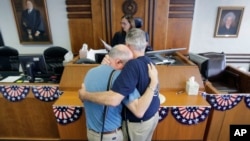The U.S. Supreme Court’s ruling legalizing same-sex marriage has sparked a furious backlash in some conservative states across the country.
While most state and county governments followed the ruling, some county clerks have stopped issuing marriage licenses or even quit their jobs in apparent defiance of the high court’s decision.
In Texas, Governor Greg Abbott accused the Supreme Court of abandoning its role as an impartial judicial arbiter and turning itself into a non-elected legislative branch where five of the nine justices imposed their personal views onto the entire country.
Religious rights
In his state, Abbott said citizens’ religious rights continued to be protected. He has issued a directive to state agencies instructing them to prioritize the protection of Texans’ religious liberties.
Many citizens said same-sex marriage is in conflict with their religious beliefs.
Texas Attorney General Ken Paxton also told those county clerks who have refused to issue marriage licenses to same-sex couples that numerous lawyers were ready to assist them in any litigation to defend their religious beliefs.
In Kentucky, Casey County Clerk Casey Davis made himself an overnight media star as well as a hate mail target when he refused to issue marriage licenses to same-sex couples who have come to his courthouse.
Davis said he had stopped issuing marriage licenses to all couples following the U.S. Supreme Court's ruling that legalized same-sex marriage.
Earlier in the week, Davis tried to meet with Democratic Governor Steve Beshear to ask him to call for a special session of the state legislature so it can pass a law allowing people to purchase marriage licenses online instead of going to the courthouse, similar to the process of purchasing a hunting or fishing license.
'My conscience'
Davis told VOA that although he took an oath to perform the office of county clerk to the best of his ability, but that ability should not go beyond his conscience.
“My conscience does not stop with the issuance of marriage licenses; my conscience is included in every decision that I make, whether I’m at work or whether I’m at home, trying to raise my family,” he said. “My ability is governed by my conscience."
Davis argued that the Supreme Court’s decision on same-sex marriage left out the rights of the people who didn’t agree with same-sex marriage.
"Somewhere along the line, someone needs to say ‘Hey, I still have rights. I don’t mind you having yours. But would you please give me the same courtesy and give me mine?’ ” he said.
Davis said he believed “the First Amendment of the Constitution of this nation put religious freedom there because if we lose that (freedom), we’ve lost everything.”
Resignation
In Mississippi, a Grenada County circuit clerk did not want to be responsible for issuing marriage licenses to same-sex couples and chose to resign after serving in that office for 24 years, saying that the Supreme Court ruling violated his core values as a Christian.
Sam Marcosson, a constitutional law professor at the Louis D. Brandeis School of Law in Kentucky, said clerks who refuse to issue marriage licenses to same-sex couples risk criminal official misconduct charges.
“It’s a misdemeanor, not a serious crime, but it’s a crime,” Marcosson said.
“That would be within the discretion of the prosecutors to bring those charges and begin the prosecution in the county, because as a government official, you have the responsibility to all the citizens to perform the duties of your office, so a potential criminal charge could be filed, if it got to that point,” he said.
Marcosson said judges could also enforce fines that would continue to grow as long as the clerks remained out of compliance with the law.
In the end, the clerks could either quit or be charged.
Marcosson said marriage license issuance is one area "in which the law is not settled from state to state.”
Businesses affected
He also noted that the Supreme court ruling affects business owners as well as government officials.
“In some states, there are nondiscrimination requirements that tell them (business owners) if you are going to be in business, you have to be in business and provide your services to all, whether it’s a same sex couple or opposite sex couple," Marcosson said.
In other states, however, there isn’t such non-discrimination requirement. “They can pick and choose which weddings they will open their business to,” he added.
Amber Duke, communication manager of the American Civil Liberties Union of Kentucky, said three counties in that state are not issuing marriage licenses to any couples.
She noted her agency filed a lawsuit against one of them, Rowan County, and its clerk on behalf four couples: two same-sex couples and two opposite-sex couples who were denied marriage licenses by the county clerk.
Government duty
The lawsuit argued that while the clerk had the absolute right to believe in whatever she wanted, as a government official sworn to uphold the law, she could not pick and choose which duties her office would perform.
“Not only (did) the Supreme Court ruling come out and say that same gender couples have the right to marry, the governor of our state, just a couple of hours after that ruling came out, issued guidelines to all of the clerks in the state and asked them to act immediately, to distribute licenses to same gender couples,” Duke said.
She said the Kentucky state attorney general had also put out statements since the ruling, saying that marriage equality is the law of the land and that county clerks need to follow the law.
“So it’s definitely very clear, and we see no legal justification that any of these clerks has for denying anyone’s marriage license,” Duke added.





